Happy “Victoria Day” (Canada)…
May 22, 2023 by GuyHeilenman · Leave a Comment
Shown below is a Canadian-themed, woodcut illustration from a sketch by Frederic Remington as printed in the Harper’s Weekly dated March 22, 1890.
To our friends up north…
Happy Victoria Day!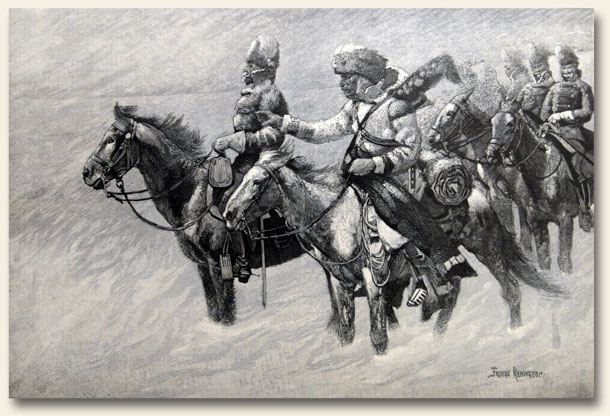
(original available at RareNewspapers.com – digital available at History’s Newsstand @ Etsy)
The Gentleman’s Magazine – Own history for pennies on the dollar…
October 14, 2022 by GuyHeilenman · Leave a Comment

To learn more about this wonderful publication, view our previous posts at:
Harper’s Monthly & The Self-Made Man – Still Learning…
October 12, 2020 by Stephanie Williams · Leave a Comment
By natural inclination, I spend a fair amount of my spare time delving into the “women’s publications” within the Rare & Early Newspapers collection. Consequently, the title of the Editor’s Table of an 19th century issue of Harper’s New Monthly dragged me in, and in the spirit of fair play I decided to dissect and disseminate the contents, using the writer’s three questions.
Who is the Self-Made Man? In the author’s view, this is not the man who achieved much because of education, as education is an outside influence that detracts credit from the man. However, a self-made man can be educated. The one who is not educated, but rises to success in spite of the lack, is not necessarily self-made, as success does not equal the morality required in a self-made man.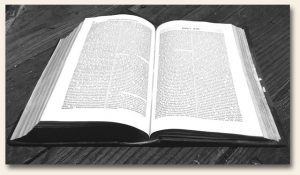
What is the Self-Made Man? Again, this is not the one who commits good deeds, although a self-made man will be characterized by them. “The difference between the two characters is a moral one. It springs from the presence or absence of the humanitarian spirit. It is all the difference between the pure love of truth and the love of opinion.”
What is his true position for good or for evil among the powers of the age? Finally, all the negatives are set aside and the author clearly promotes a man who is driven to find truth — not in new discoveries or insights, but in the wisdom of the ages that has been tested by time, and continues to be trustworthy. Ultimately, the author highly esteems the members of the Protestant Reformation, and the things they accomplished. “It was an age where old truths were brought to light and re-established as old truths. It was a most serious age; it was a modest age; and in all these respects, especially in the latter, it differed widely from our own.”
The final condemnation of the modern era, male and female, is contained in the author’s closing remarks:
All the writings of every kind during that remarkable period, and, we may even say, the century that followed it, would not present so much of this frothy self-laudation, as may be heard in one Hope Chapel meeting of ‘strong-minded women’ and ‘self made’ men.
The Gentleman’s Magazine & Poetry… Still learning…
September 28, 2020 by Stephanie Williams · Leave a Comment
Nestled among the prosaic commodity prices, legal decisions, and historical chronicles that regularly appear in an issue of Gentleman’s Magazine is a section that seems surprising to me — “Select Poetry, ancient and modern.” In some ways, this is a reminder that times certainly have changed, and things are not as they always were. A current publication for the leaders of our era, such as Forbes or Bloomberg or The Wall Street Journal would not contain poetry, unless a noteworthy personage deviated from business acquisition long enough to write, or possibly promote a struggling artist in the name of philanthropy, etc.
But, once upon a time, the well-educated person was learned in literary as well as economic matters. As the 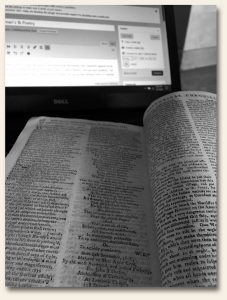 column title hints, the classical emphasis on education set a background that persisted into all arenas of life. With this in mind, I delved into the section and became even further struck by the subject matter of my sampling in meter and rhyme. The closing refrain to each stanza concludes that nothing in life matters without….love.
column title hints, the classical emphasis on education set a background that persisted into all arenas of life. With this in mind, I delved into the section and became even further struck by the subject matter of my sampling in meter and rhyme. The closing refrain to each stanza concludes that nothing in life matters without….love.
But weak is our vaunt
While something we want,
More sweet than the pleasure that Prospects can give.
Come, smile, damsels of Cardigan,
Love can alone make it blissful to live.
The author of this particular poem only provided his (presumably) initials to this listing of Prospects, Nectar, Odours, Music, Friendship, Learning, Riches and Honour. All, the poet asserts, are not sufficient to bring bliss to life — only love can do that. The musings that follow include “Ode to a Goldfinch”, “An Astronomical Thought” and “A Translation of the Epitaph”. Put together, they summarize the principle concerns of the time period — the natural and known world, the world yet to be discovered, happiness within all experiences, and the context provided by knowledge of eventual death.
That is, indeed, a selection of ancient and modern — even the modern of today.
I’m New Here: Week Thirty-Three…
October 11, 2019 by Stephanie Williams · Leave a Comment
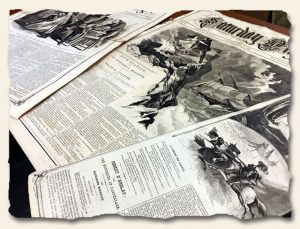 This week, while pulling issues that contain Emily Dickinson death notices, I read about the first public appearance of Dr. Oliver Wendell Holmes and also the institution of the Income Tax. As this was in 1886, I was surprised at the latter. Actually, I was surprised to see so many famous names and events in just a ten day span within that May. Oscar Wilde was hosting parties, Chicago was caught up in the Haymarket affair, and Coca-Cola was invented by a pharmacist. The rabbit trail I chose to follow (after investigating this whole Federal Income Tax thing that has historically been attributed to Woodrow Wilson’s presidency almost thirty years later) began with the following words to the Editor of the New York Times: “Mr. Putnam’s remarks on the impropriety of republishing [Washington] Irving’s works in their unrevised form, have but one fault; they are not strong enough.”
This week, while pulling issues that contain Emily Dickinson death notices, I read about the first public appearance of Dr. Oliver Wendell Holmes and also the institution of the Income Tax. As this was in 1886, I was surprised at the latter. Actually, I was surprised to see so many famous names and events in just a ten day span within that May. Oscar Wilde was hosting parties, Chicago was caught up in the Haymarket affair, and Coca-Cola was invented by a pharmacist. The rabbit trail I chose to follow (after investigating this whole Federal Income Tax thing that has historically been attributed to Woodrow Wilson’s presidency almost thirty years later) began with the following words to the Editor of the New York Times: “Mr. Putnam’s remarks on the impropriety of republishing [Washington] Irving’s works in their unrevised form, have but one fault; they are not strong enough.”
It is Autumn with a capital “A” in the northeast United States where, flanked by hilly vistas of multi-hued splendor, every street corner proclaims this the month of Hallowe’en. Washington Irving, author of the famous ghost story “The Legend of Sleepy Hollow”, could easily have been one of the serialized authors featured in the 1869 “Saturday Night” issues I have been pulling for a Philadelphia area collector. And October is definitely the time of year in which strange, extraordinary and macabre stories would have provided thrilling weekend entertainment to a 19th century culture blessedly devoid of electronic clamor.
I didn’t know about Irving’s first published work, or the misinformation campaign to hype interest prior to the release of A History of New York. I read about his “Knickerbocker” alter ego whose fictitious disappearance sparked a national following. This moniker influenced sports teams, architectural structures, social groups, and even a toy company. To this day, a resident of Manhattan is a Knickerbocker — nicknamed after a man who never was.
So, I am thankful for the censure that drew my attention away from the tax tables and the following words of “THE NEW INTERNAL REVENUE LAW. Topics of Interest to Everybody”:
Among these the Tax and Tariff laws are prominent, possessing an interest for every one, inasmuch as they most sensibly affect the cost of living, enhancing the prices of everything we eat, drink, or wear, adding to the value of articles of both necessity and luxury. The Tax law especially appeals directly to our pockets; and we find that a share of our profits from manufacturing any article, as well as a proportion of the income which we annually receive, is due to the Government.
I would much rather consider impropriety of a literary kind.
I’m New Here: Week Thirty (gasp!)
September 13, 2019 by Stephanie Williams · Leave a Comment
 Even eight months into my first year here, I still have important job skills to acquire. This week Guy introduced me to The Weekly Register, also known as the Niles’ Weekly Register. He actually didn’t provide much of an introduction as there was new inventory to pick up, but he mentioned the title and left me to find my way to the back wall of the annex.
Even eight months into my first year here, I still have important job skills to acquire. This week Guy introduced me to The Weekly Register, also known as the Niles’ Weekly Register. He actually didn’t provide much of an introduction as there was new inventory to pick up, but he mentioned the title and left me to find my way to the back wall of the annex.
Before I started the metaphorical digging in, I tried to get my bearings first by looking into the background of this publication that stretched from 1811 until 1848. Our own item description mentions “significant coverage of the War of 1812”, so I extracted an issue from the title year, settling on December 5, 1812. Just below the town and date, a centered, italicized quote from Virgil’s “The Aeneid” assured me I would appreciate this new acquaintance.
Forsan et haec olim meminisse juvabit, “Maybe someday you will rejoice to recall even this.” I wonder if it was intended to bolster the staff or the new country. At any rate, the printing address on the following line is a cheery thing. “Printed and published by H. Niles, South-st. next door to the Merchants’ Coffee House”.
The issue I borrowed from the racks covers the legislatures of New Hampshire, New York, New Jersey and North Carolina, where (if the reports are accurate) the members were busily balancing affairs of their individual states with decisions concerning the authority of the president to call out a state’s militia. I was struck by the measured, pragmatic way one William Plumer attempted to persuade the governing body of New Hampshire. My pile of recommended reading for current politicians is growing taller every day.
A list of the “excellent toasts drank at New York, in commemoration of the evacuation of that city by the British” lauds the particular prowess of American sloops of war and the late Captain Jones, resting “on the bosom of the Atlantic.”
There is a four page section devoted to “Events of the War” packed with locations of ships, letters from various regiments, descriptions of force strength, and even a transcription of a Brigadier-General’s stirring call to arms.
“Rewards and honors await the brave. Infamy and contempt are reserved for cowards.
Companions in arms! — You came to vanquish a valiant foe. I know the choice you will make. Come on, my heroes!”
I can’t help but think that if we continued to work at bringing forth great words we might encourage heroic ideals in a culture so untethered to traditions of excellence in speech and conduct. Then again, I am only seeing the parts of 1812 that made it into print.
Anyway, if you don’t know The Weekly Register, I hope you too have opportunity to become acquainted. It has certainly been my pleasure.
I’m New Here: Week Seventeen…
June 7, 2019 by Stephanie Williams · Leave a Comment
Despite the obvious gender bias inherent in the title, I like “The Gentleman’s Magazine“, as I suspect many non-gentlemen of the time did as well. This week I pulled an issue from April of 1775 – mainly because I enjoy the tone of superiority that saturates those months before what we now know of as the Revolutionary War (or whichever various title you prefer). “Colonial upstarts” were causing commotion and consternation to the rest of the world, but mainly to the ruling class in London.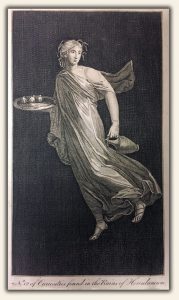 The heading of the very front page of the one perched on my desk amidst the new catalog excitement is entitled, “Continuation in the House of Lords on the Address to his Majesty respecting the Situation of Affairs in America”. What follows is a labyrinthine balance between appeasing the vanity of the monarch, and an attempt to elucidate the different aspects of potential vulnerability to defeat. In particular, the French and Spanish ships continuing to trade with the colonists brought great consternation. “Does the noble Earl pretend to interpret this explanation [England would be “…at liberty to seize any of their ships trading with American subjects”] generally, so as to authorize our taking their vessels at sea? If he does not, what can such a vague deluding promise avail? If he does, then I will venture to assure his Lordship, that he is miserably deceived; and that the first attempt to prevent French or Spanish ships from navigating the American seas will furnish them with an opportunity of asserting their maritime freedom, of making reprisals, and of justifying their conduct to the other great states of Europe, who are known to be long jealous of what they are pleased to call our despotic claim to the sovereignty of the ocean.”
The heading of the very front page of the one perched on my desk amidst the new catalog excitement is entitled, “Continuation in the House of Lords on the Address to his Majesty respecting the Situation of Affairs in America”. What follows is a labyrinthine balance between appeasing the vanity of the monarch, and an attempt to elucidate the different aspects of potential vulnerability to defeat. In particular, the French and Spanish ships continuing to trade with the colonists brought great consternation. “Does the noble Earl pretend to interpret this explanation [England would be “…at liberty to seize any of their ships trading with American subjects”] generally, so as to authorize our taking their vessels at sea? If he does not, what can such a vague deluding promise avail? If he does, then I will venture to assure his Lordship, that he is miserably deceived; and that the first attempt to prevent French or Spanish ships from navigating the American seas will furnish them with an opportunity of asserting their maritime freedom, of making reprisals, and of justifying their conduct to the other great states of Europe, who are known to be long jealous of what they are pleased to call our despotic claim to the sovereignty of the ocean.”
When I read this, I start to understand a little bit this American spirit, this classification under which our country has been perceived by the world, from the very earliest days. This mindset changed the world. And that is an immense, and not embarrassing, thought.
But, lest you think the GM’s are all politics, I would like to recommend any meteorology enthusiasts plug in the data compiled monthly and displayed on the inside cover page. The average prices of corn, wheat, rye, barley, oats and beans are delineated by county. Genealogists will enjoy the Births, Marriages, and Deaths alongside the list of Promotions and Bankrupts. There are book reviews and parish reports and a comprehensive section entitled “Historical Chronicle“, which gives an overview of multiple aspects of the state of the world.
Anyway, to delve into these accounts of the earliest days of this country is to see the tenacity that fueled an eventual nation – and perhaps nurture an admiration for what was once made, an inspiration for all that could be made again.
You can read more about Gentleman’s Magazines via previous posts at: Gentleman’s Magazines
The Traveler… “…I could see no promise in him…”
December 5, 2016 by The Traveler · Leave a Comment
Today I traveled to New York City by the means of Harper’s New Monthly Magazine dated December, 1866. I found the first appearance of Mark Twain in a national magazine with the publishing of “Forty-Three Days in an Open Boat. Compiled From Personal Diaries.”
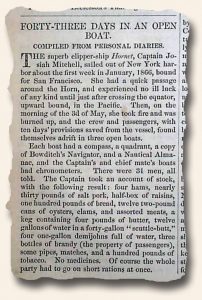 I also found through the Harper’s Monthly website the following information. “Mark Twain’s first article in Harper’s was miss-attributed to Mark Swain. The story, “Forty-three Days in an Open Boat” (December 1866), is an account of the Hornet, a clipper ship that caught fire in the ocean, leaving its crew adrift. Twain referred to it as the “first magazine article I ever published,” though he had published numerous pieces in other periodicals and newspapers under such names as Thomas Jefferson Snodgrass; W. Epaminondas Adrastus Blab; Rambler; Grumbler; and Peter Pencilcase’s Son, John Snooks.
I also found through the Harper’s Monthly website the following information. “Mark Twain’s first article in Harper’s was miss-attributed to Mark Swain. The story, “Forty-three Days in an Open Boat” (December 1866), is an account of the Hornet, a clipper ship that caught fire in the ocean, leaving its crew adrift. Twain referred to it as the “first magazine article I ever published,” though he had published numerous pieces in other periodicals and newspapers under such names as Thomas Jefferson Snodgrass; W. Epaminondas Adrastus Blab; Rambler; Grumbler; and Peter Pencilcase’s Son, John Snooks.
Mark Twain was born thirty-one years earlier, and two months premature, as Samuel Langhorne Clemens, in Florida, Missouri. “When I first saw him I could see no promise in him,” his mother said. The Clemenses moved several miles upstate, to the Missouri River-side Hannibal, when he was four; the town would later inspire the fictional St. Petersburg of his two most famous works, The Adventures of Tom Sawyer (1876) and The Adventures of Huckleberry Finn (1885)…”.
Twain didn’t turn out too bad after-all!
~The Traveler
The Traveler… giving thanks… not on the Sabbath…
October 17, 2016 by The Traveler · Leave a Comment
 I traveled to Boston today by the way of the Independent Chronicle dated October 14, 1816. I found “By His Excellency John Brooks, Governor of the Commonwealth of Massachusetts, A Proclamation, for a day of Public Thanksgiving and Prayer.” had been proclaimed. This was to be held on the Thursday, November 28.
I traveled to Boston today by the way of the Independent Chronicle dated October 14, 1816. I found “By His Excellency John Brooks, Governor of the Commonwealth of Massachusetts, A Proclamation, for a day of Public Thanksgiving and Prayer.” had been proclaimed. This was to be held on the Thursday, November 28.
Also found was an article entitled “Sabbath Laws” in which Judge Putnam “…repealed all former provisions upon the subject whether by statue or common law; that no act of labour, therefore, upon that day are lawful, except in cases of necessity or charity; and that prosecutions upon the statute are not within the exception…”. Too bad we cannot go back to those days…
~The Traveler
The Traveler… the first “learned society” of Washington, D.C.
August 15, 2016 by The Traveler · Leave a Comment
I traveled today to Washington, D.C. by the way of the National Intelligencer dated August 15, 1816. I found there the announcement of the creation of the first “learned society” in Washington D.C.: “A number of the citizens of the District of Columbia, impressed with the importance of forming an association for the purpose of promoting useful knowledge, met on the 28th day of June, 1816,… agreeably to public notice the committee appointed as aforesaid reported the following draft of a constitution which was unanimously agreed to, after having changed the name of the association to that of the COLUMBIAN INSTITUTION for the promotion of Arts and Sciences…” (see image below).
They were responsible for the acquiring the many different species of plants and trees, an idea to apply to Congress for “the appropriation of about 200 acres of ground called “the Mall” which was designed in the original plan of the city for a public garden, the beginning of the botanic garden, many items which are now in the Smithsonian Institute, and more. Many prominent people of the day became were members, including some Presidents.
~The Traveler


